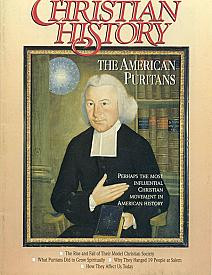Blown off Course, Puritans Drew up the Mayflower Compact
EARLY IN THE SEVENTEENTH CENTURY, James I of England’s mistreatment of Puritans and Separatists drove a number to flee their homeland. At first they went to the Netherlands, but later emigrated to America with some non-Puritans whom they called “strangers.” James granted these “Pilgrims” a charter to settle in a vast territory called “Virginia.” In 1620, they sailed in a small ship named the Mayflower.
Blown off course, supplies running low, the Mayflower reached land at Cape Cod, much farther north than planned. An attempt to head south brought them into treacherous shoals, so they turned back to the Cape. Now the question was what they should do next.
On this day, 21 November l620, the Pilgrims and the “strangers” sailing with them gathered in the ship’s main cabin for consultation. As their charter was not valid in this region, it left no one in command, and some of the “strangers” were expressing discontent. Mutiny hung in the air; unity was essential if they were to proceed. Their discussion resulted in a resolve to create their own government. This is known as the Mayflower Compact.
The document was not entirely original. They had produced something similar when drafting a church covenant in 1607, the year they separated from the English Church and fled to Holland.
The meat of the Mayflower Compact was this paragraph:
Having undertaken, for the glory of God, and advancement of the Christian faith and honor of our king & country, a voyage to plant the first colony in the Northern parts of Virginia, do by these presents solemnly & mutually in the presence of God, and one of another, covenant, & combine our selves together into a civil body politic; for the better ordering, & preservation & furtherance of the ends aforesaid; and by virtue hereof, to enact, constitute, and frame such just & equal laws, ordinances, acts, constitutions, & offices, from time to time, as shall be thought most meet & convenient for the general good of the colony: unto which we promise all due submission and obedience. In witness wherof we have hereunder subscribed our names at Cape Cod the 11 of November, in the year of the raigne of our sovereign Lord king James of England, France, & Ireland the eighteenth and of Scotland the fifty-fourth. Ano. Dom. 1620.
The Compact was dated 11 November because Britain was still using the Julian calendar, which was ten days behind the solar year. All the adult men aboard the ship signed it. The contract served as the Pilgrims’ charter of self-governance for fifty years. It was one of several precedents to America’s later adoption of a constitution.
—Dan Graves
----- ----- -----
In First Freedom, track the development of the idea of religious freedom from the Puritans to the First Amendment of the United States Constitution. Watch it at RedeemTV.
(Purchase First Freedom at Vision Video.)
For more on the Puritans in America, read Christian History #41, The American Puritans








